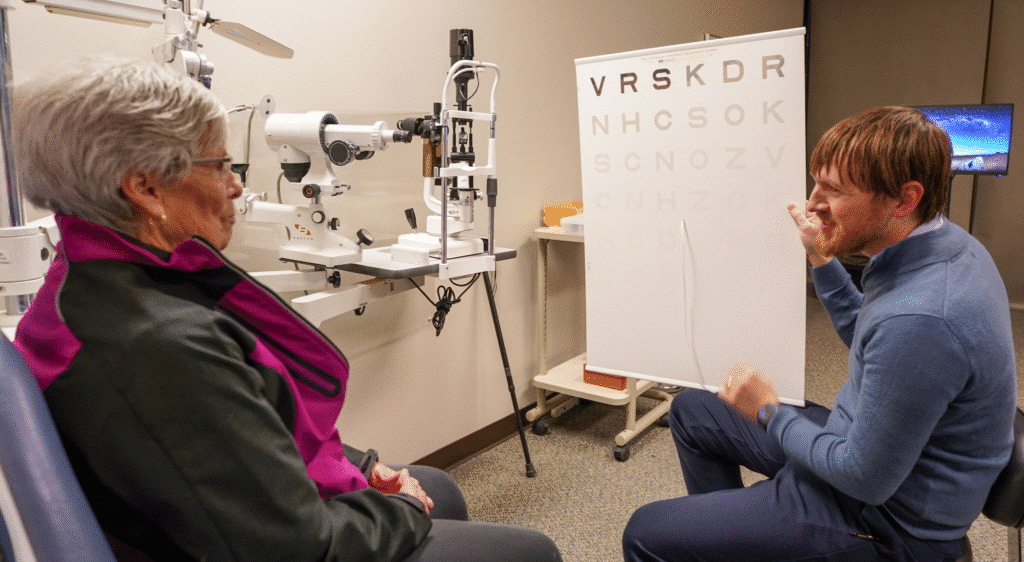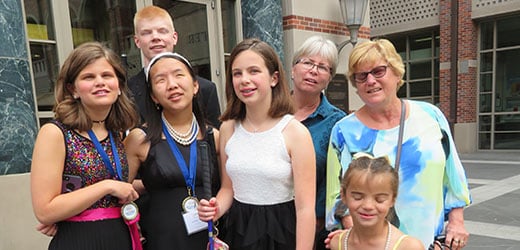What is Low Vision – And How Can You Manage It?

When most people think of vision problems, they imagine a quick fix: glasses, contacts or maybe surgery. But for millions of Americans, these solutions aren’t enough. They live with low vision: a condition that can’t be fully corrected and affects everyday life in significant ways.
At Alphapointe Low Vision Clinic, we specialize in helping people adapt to vision loss with confidence, tools and personalized support. Whether you’re facing changes yourself or supporting a loved one, understanding low vision is the first step to reclaiming independence.
What Is Low Vision?
Low vision is a term used to describe significant visual impairment that cannot be corrected with standard glasses, contact lenses, medication or surgery. It’s not complete vision loss, but it does interfere with daily tasks like reading, cooking, driving or recognizing faces.
This condition can affect central vision, peripheral vision, contrast sensitivity, depth perception or night vision. Everyone’s experience with low vision is different, and it often changes gradually over time.
What Causes Low Vision?
Low vision is most commonly associated with aging, but it can affect people of all ages. Some of the most common causes include:
- Macular Degeneration – A leading cause of central vision loss in older adults.
- Glaucoma – A group of diseases that can damage the optic nerve and lead to peripheral vision loss.
- Diabetic Retinopathy – A complication of diabetes that affects the blood vessels in the eye.
- Retinitis Pigmentosa – A genetic condition that causes gradual loss of night and side vision.
- Stroke or Brain Injury – Can impact how the brain interprets visual signals.
- Cataracts or Eye Trauma – In some cases, even after treatment, vision may not fully return.
Signs You or a Loved One May Be Experiencing Low Vision
Low vision often develops slowly. Many people don’t realize how much their vision has changed until it significantly affects daily life. Here are some early signs to watch for:
- Difficulty reading print, even with glasses
- Trouble recognizing faces from a distance
- Needing brighter lighting for close tasks
- Issues with glare or contrast
- Bumping into objects or missing steps
- Feeling overwhelmed in unfamiliar environments
If any of these sound familiar, a low vision evaluation may be a helpful next step.

Managing Low Vision: Tools, Techniques and Training
While low vision cannot be fully reversed, there are many ways to adapt, adjust and maintain your independence. This is where Alphapointe Low Vision Clinic comes in.
We provide personalized low vision rehabilitation that focuses on helping people do what matters most – on their terms. That includes:
Assistive Devices
Magnifiers, electronic readers, and specially designed glasses (like telescopic lenses or prisms) can help with specific tasks like reading, watching TV or using a computer.
Skills Training
We teach people how to adjust their environment (lighting, contrast, organization) and develop new habits and techniques to navigate daily life with more ease and safety.
Home Environment Support
Our team can assess your living space and make recommendations to help you move more safely and confidently, such as labeling items, reducing fall risks or using tactile guides.
Technology Support
From screen readers to smartphone apps, technology can be a powerful tool for maintaining connection, productivity and access to information. We help you explore and learn what works for you.
Orientation and Mobility
Specialized training helps people with vision loss safely navigate their homes, neighborhoods and public spaces, using tools like white canes and techniques like listening to traffic flow.
Emotional Support
Vision loss can be emotionally challenging. Our compassionate approach helps people cope with change, reduce isolation and rebuild confidence.
How Alphapointe Low Vision Clinic Can Help
We know that adjusting to vision loss isn’t just about seeing better – it’s about living better. Alphapointe Low Vision Clinic is a specialized low vision rehabilitation center that supports people when traditional eye care is no longer enough.
Whether referred by an ophthalmologist or reaching out directly, patients receive comprehensive, one-on-one support from a team that includes optometrists, certified low vision rehabilitation specialists, orientation and mobility instructors, and assistive technology experts.
We don’t just assess vision, we help people build skills, gain confidence and stay connected to what matters most.
Who We Serve
Alphapointe Clinics serve:
- Older adults navigating age-related vision changes
- People recovering from stroke or neurological conditions
- Individuals with progressive eye diseases
- Caregivers seeking support for their loved ones
- Referring physicians and care teams looking to extend functional support beyond medical treatment
We work in partnership with families, healthcare providers and community organizations to ensure coordinated, holistic care.

Changing the Way People See Vision Loss
For many people, hearing “there’s nothing more we can do” from their eye doctor feels like the end of the road. But at Alphapointe, it’s just the beginning of a new path forward – one that’s built around possibility, self-reliance and purpose.
If you or someone you love is living with vision loss, don’t wait to seek support. You don’t have to navigate this alone, and with the right tools and guidance, you can live more independently and confidently.
Alphapointe Low Vision Clinic serves patients across the Midwest and beyond. To schedule an evaluation or learn more about our vision rehabilitation services, visit Alphapointe.org/clinics or call 816-237-2020.





